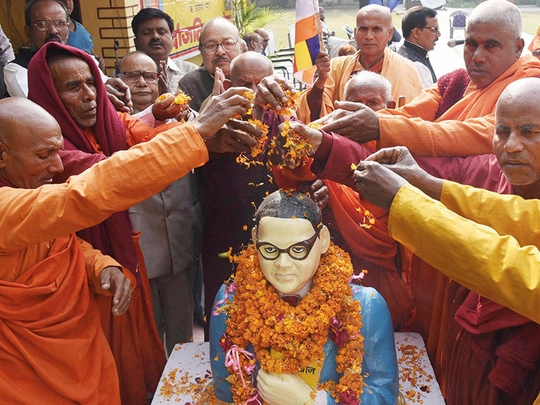
Mumbai: India paid homage to Dr Bhimrao Ramji Ambedkar, the architect of the country’s Constitution and social reformer revered by millions of Dalits, on his 61st death anniversary.
With thousands of people from Maharashtra and across the country converging at his memorial on the seafront in Shivaji Park, Dadar, Mumbai, state and civic authorities annually go into an extraordinary preparation mode. Arrangements for security, food, water, accommodation and even transport is managed by the state to make the pilgrims comfortable.
BEST, the city’s public transport, ran special buses between Dadar station and Shivaji Park for the visitors. Free snack stalls were also put up for them.
The Brihanmumbai Municipal Corporation installed temporary sheds, mobile toilets and six medical stalls at Shivaji Park, Dadar Station, Rajgriha (Ambedkar residence) and Kurla railway terminus in view of the huge rush of the Dalit icon’s followers. The rains that followed Cyclone Ockhi impact and the rain-soaked Shivaji Park, where most spend the night, did not deter the pilgrims.
Prime Minister Narendra Modi, President Ram Nath Kovind and Vice-President Venkaiah Naidu paid rich tributes to Ambedkar, popularly known as Baba Saheb, who passed away on this day in 1956.
Maharashtra Chief Minister Devendra Fadnavis who visited the memorial, Chaityabhoomi in Dadar, Wednesday morning, said the work on Ambedkar’s massive memorial at the Indu Mill compound will begin in a month. He also tweeted, “We are working to take the fruit of development to the common man and our inspiration is Dr Babasaheb Ambedkar ji, who gave us one of the best Constitutions in the world, which ensures every right to every Indian citizen.”
State Governor Vidyasagar Rao also paid tributes to Ambedkar at Chaityabhoomi as well as all the government organisations which observed the death anniversary.
Ambedkar was a jurist, economist, politician and social reformer who vigorously campaigned against social discrimination against the ‘untouchables’ while also supporting the rights of women and the work force. He was Independent India’s first law minister.
As a student he earned doctorates in economics from both Columbia University and London School of Economics and his later life was marked by his political activities, in campaigning and negotiating for India’s independence, publishing journals, advocating political rights and social freedom of Dalits. In 1956, he converted to Buddhism, initiating mass conversions of Dalits.
In 1990, the Bharat Ratna, India’s highest civilian award, was posthumously conferred upon Ambedkar.












